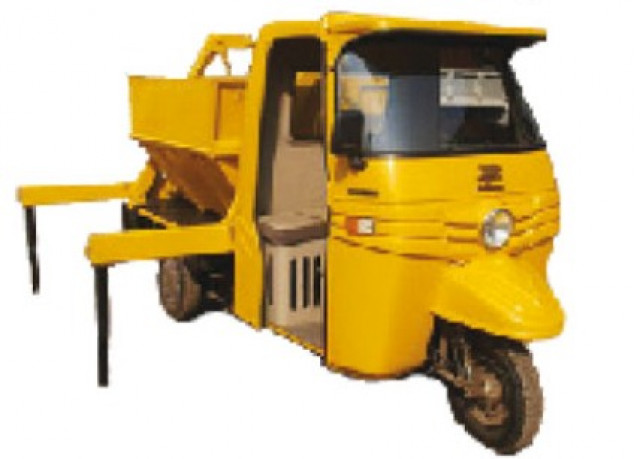Ricksaaf: For those hard to reach places in Karachi, a rickshaw that wants your trash
The rick-saaf is a combination of a rickshaw and a garbage truck.

The rick-saaf is a combination of a rickshaw and a garbage truck that can collect waste from those hard to reach places where the onus is generally left to the scavenger.
“There used to be a time when we used to have daily door-to-door garbage collection where I live,” says entrepreneur Khayam Husain, “now we don’t even have a proper dumpster in my neighborhood. The closest one in Clifton Block 5 is on Mai Kolachi.”
Husain’s own neighborhood and his work in Sindh’s flooded areas with the Karachi Relief Trust inspired him to find solutions for waste management. “A lot of our urban centres in Sindh are actually just slums because of the waste management system. I wanted to design a vehicle that could get into small areas.”
The prototype Husain’s company Autocom has designed takes a rickshaw and adds a steel container that can take up to 200kg. This, then, operates through hydraulics with an independent power pack that uses a separate car battery, which doesn’t put any strain on the engine or fuel consumption. He adds that it is a simple system that can be operated by virtually anyone.
A final price hasn’t been set yet but Husain says it costs approximately Rs400,000 to produce it with the hydraulic system accounting for Rs100,000 of the entire cost. His company can produce up to 50 units a day but this can be scaled up if required.
A household in Karachi produces an average of 2.5kg of waste everyday, which means that a single Ricksaaf could do the trick for a 100 houses in a single trip.
“We would like the government to [think about] a complete programme with us that also includes the scavengers,” says Husain. “My strategy is to include all stakeholders and devise a means so that their [scavengers] livelihoods are not threatened.”
About 55,000 families depend on garbage picking, according to a 2010 report on solid waste management for Karachi that was co-authored by Muhammad Khalid. He is an environmental engineer working with the Sindh government. He warns of the risks scavengers put themselves at to do their job.
“The kids picking up garbage become mobile carriers of infectious diseases the way that trash is thrown around these days,” he says. Thirty per cent of the city’s waste comes from hospitals and out of this a small percentage is infectious. Unfortunately, these children and adults are doing a job that the city government should be doing.
“We would like the government to facilitate a complete programme with us that also includes the scavengers,” argues Husain, who believes that there are ways to include them so that their livelihood isn’t threatened.
There should be more than enough work for everyone as Karachi produces an estimated 9,000 tons of waste daily. Out of which only 4,500 is lifted and only a little over 2,000 tons make it to the designated landfills in Deh Jam Chakro and Gondpass.
According to Khalid’s report, the city has 12,000 sanitary workers and about 4,100 garbage bins but this is not enough and as a result uncollected garbage is rotting in the open or is burnt. “Most waste lies on the street and is dispersed before it is picked up because of the wind or rain [which rot it],” Khalid says. He points out that this means that the moisture content is lost and thus we lose out on the potential for producing bio-gas or fertiliser from the waste.
Part of the problem is also that the landfill sites are at long distances from the city and only about 300 out of 1,500 trips by garbage trucks end up doing the job properly.
“The government needs to come forward and invest in such programmes,” argues Khalid. “This is a low-cost solution that is more efficient than the same service being provided by boys on donkey-carts.”
Published in The Express Tribune, February 29th, 2012.



















COMMENTS
Comments are moderated and generally will be posted if they are on-topic and not abusive.
For more information, please see our Comments FAQ